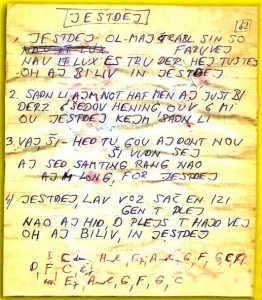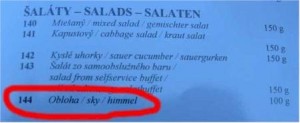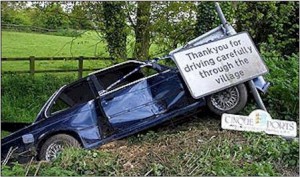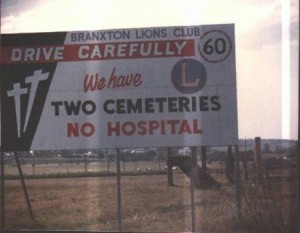THE NAME
– Hello, are you there?
– Yes, who are you please?
– I’m Watt.
– What’s your name?
– Watt’s my name.
– Yes, what’s your name?
– My name is John Watt.
– John what?
– Yes, are you Jones?
– No I’m Knott.
– Will you tell me your name then?
– Will Knott.
– Why not?
– My name is Knott.
– Not what?
– Not Watt, Knott.
– What?
(slovná hračka založená na homofónoch, rovnako znejúcich slovách s rôznym významom.
Watt a What sa vyslovujú rovnako /wot/, not a Knott sa vyslovujú /not/)
ARK OR ARC?
„What was Noah’s wife’s name?“
„Joan of Arc?“
„Ako sa volala Noemova manželka?“
„Johanka z Arku?“
(slovná hračka založená na homofónoch, rovnako znejúcich slovách s rôznym významom.
Noah=Noe postavil Ark=archu. Ark a Arc sa vyslovujú rovnako)
JESTDEJ
BANÍK Z OSTRAVY má ísť do Anglicka a ťažká si kamarátovi, že čo si tam počne, keď nevie ani slova po anglicky.
Kamarát ho upokojuje: „Nic se neboj. Podívej: bu-deš mlu-vit hez-ky po-ma-lu a sro-zu-mi-tel-ně a všech-no bu-de v po-řád-ku.“
Baník tak urobil. V Anglicku v hoteli si sadol na recepcii na sedačku, otočil sa k tam sediacemu pánovi a povedal: „Do-brý den. Já su ha-víř z O-stra-vy a su ta-dy na do-vo-le-né.“
Ten pán sa naňho pozrel a odvetil: „Do-brý den. Já su ta-ky ha-víř z O-stra-vy. A proč te-dy, když jsme o-ba z O-stra-vy, mlu-ví-me an-glic-ky?“
ODD SIGNS IN ENGLAND
IN A LAUNDROMAT: Automatic washing machines. Please remove all your clothes when the light goes out.
(laundromat /’lo:ndrəmæt/ samoobslužná práčovňa, remove /ri’mu:v/ = 1. vybrať, 2. vyzliecť, go out = zhasnúť)
IN A LONDON DEPARTMENT STORE: Bargain Basement Upstairs
(bargain basement = oddelenie zliav v obchode; basement = suterén; upstairs = na poschodí)
IN AN OFFICE: Would the person who took the step ladder yesterday please bring it back or further steps will be taken.
(step ladder = dvojitý rebrík; take steps = podniknúť opatrenia, zakročiť)
IN ANOTHER OFFICE: After the tea break, staff should empty the teapot and stand upside down on the draining board.
(draining board = odkvapkávač na riad)
ON A CHURCH DOOR: This is the gate of Heaven. Enter ye all by this door. (This door is kept locked because of the draft. Please use side entrance)
(church = kostol; ye = you; draft = prievan; side entrance = bočný vchod)
OUTSIDE A SECOND HAND SHOP: We exchange anything – bicycles, washing machines etc. Why not bring your wife along and get a wonderful bargain.
(bring along = priviesť so sebou; bargain = výhodná kúpa)
QUICKSAND WARNING: Quicksand. Any person passing this point will be drowned. By order of the District Council.
(quicksand = tečúci/pohyblivý piesok; drown = utopiť (sa); by order of the District Council = na základe príkazu Okresnej rady)
NOTICE IN A DRY CLEANER’S WINDOW: Anyone leaving their garments here for more than 30 days will be disposed of.
(dry cleaner’s = chemická čistiareň; garments = šatstvo; dispose of = zlikvidovať)
IN A HEALTH FOOD SHOP WINDOW: Closed due to illness.
SPOTTED IN A SAFARI PARK: Elephants Please Stay In Your Car.
(spot = zbadať)
SEEN DURING A CONFERENCE: For anyone who has children and doesn’t know it, there is a day care on the first floor.
NOTICE IN A FIELD: The farmer allows walkers to cross the field for free, but the bull charges.
(walker = chodec; for free= zdarma; bull = býk; charge = 1. účtovať, 2. napadnúť, zaútočiť)
MESSAGE ON A LEAFLET: If you cannot read, this leaflet will tell you how to get lessons.
(leaflet = leták)
ON A REPAIR SHOP DOOR: We can repair everything. (Please knock hard on the door – the bell doesn’t work)
(repair shop = opravovňa; knock = klopať; work = fungovať)
SPOTTED IN A TOILET IN A LONDON OFFICE BLOCK: Toilet out of order. Please use floor below.
(office block = kancelárska budova; out of order = pokazený; floor = 1. dlážka, 2. poschodie)
BLONDE
A blonde and a lawyer are seated next to each other on a flight from Los Angeles to New York. The lawyer asks if she would like to play a fun game. The blonde, tired, just wants to take a nap, so she politely declines and rolls over to the window to catch a few winks. The lawyer persists and explains that the game is easy and a lot of fun.
He says, „I ask you a question, and if you don’t know the answer, you pay me five dollars, and vice versa.“
Again, she declines and tries to get some sleep.
The lawyer, now agitated, says, „Okay, if you don’t know the answer, you pay me $5, and if I don’t know the answer, I will pay you $500.“
This catches the blonde’s attention and, figuring there will be no end to this torment, agrees to the game.
The lawyer asks the first question: „What’s the distance from the earth to the moon?“
The blonde doesn’t say a word, reaches into her purse, pulls out a $5.00 bill, and hands it to the lawyer.
„Okay,“ says the lawyer, „your turn.“
She asks, „What goes up a hill with three legs and comes down with four legs?“
The lawyer, puzzled, takes out his laptop computer and searches all his references … no answer. He taps into the air phone with his modem and searches the Internet and the Library of Congress … no answer. Frustrated, he sends e-mails to all his friends and coworkers but to no avail.
After an hour, he wakes the blonde and hands her $500.
The blonde thanks him and turns back to get some more sleep.
The lawyer, who is more than a little miffed, stirs the blonde and asks, „Well, what’s the answer?“
Without a word, the blonde reaches into her purse, hands the lawyer $5, and goes back to sleep.
And you thought blondes were dumb.
(lawyer = právnik; decline = odmietnuť; agitated = vzrušený, rozčúlený; figure = usúdiť; torment = mučenie; puzzled = zmätený; miffed = naštvaný, napálený; dumb = hlúpy, natvrdnutý)
MISUNDERSTANDING…
A German tourist arrives at a French airport.
The immigration officer asks him, „Occupation?“
The tourist replies, „No, no! Just visiting.“
(occupation = 1. povolanie, 2. okupácia)
NECH ŽIJÚ AMATÉRI
(sky = obloha, nebo; obloha jedla sa nazýva garnish(ment))
A TRUE STORY FROM THE JAPANESE EMBASSY IN US
Prime Minister Mori was given some basic English conversation training before he visits Washington and meets with President Bill Clinton.
The instructor told Mori: „Prime Minister when you shake hand with President Clinton, please say ‚how are you‘.
Then Mr. Clinton should say ´I am fine, and you?´ Now you should say ‚me too‘. Afterwards we translators will do all the work for you.“
It looks quite simple, but the truth is…
When Mori met Clinton, he mistakenly said „Who Are You ?“
Mr. Clinton was a bit shocked but still managed to react with humor: „Well, I am Hilary’s husband, ha ha…“
Then Mori replied confidently „Me too, ha ha ha..“ Then there was a long silent moment in the meeting room…
(Prime Minister = predseda vlády; translator = prekladateľ; mistakenly = omylom; reply = answer = odpovedať; meeting room = zasadačka)
ARE YOU SURE?
George Bernard Shaw once wrote that there were two words in English spelled with „s“ but pronounced with „sh“.
A lady wrote to him: „You must be wrong, sir. There is only one such word, namely sugar.“
His reply contained only one question, „Are you sure, Madam?“
DIVORCE POLISH STYLE
A Polish man married a Canadian girl after he had been in Canada a year or so and, although his English was far from perfect, they got on very well. Until one day he rushed into a lawyer’s office and asked him if he could arrange a divorce for him-„very quick. “ The lawyer said that the speed for getting a divorce would depend on the circumstances (okolnosti) and asked him the following questions:
LAWYER: Have you any grounds? (grounds = 1. dôvody, 2. pozemky)
POLE: JA, JA, an acre and half and a nice little home with 3 bedrooms. (Pole = Poliak)
LAWYER „No,“ I mean what is the foundation of this case?“ (foundation = 1. opodstatnenie, 2. základ stavby)
POLE: „It is made of concrete, brick and mortar,“ he responded.
LAWYER: „Does either of you have a real grudge?“ (grudge = nenávisť, zášť; číta sa podobne ako garage = garáž)
POLE: „No,“ he replied, „We have a two-car carport and have never really needed one.“ (carport = prístrešok pre auto)
LAWYER: „I mean, What are your relations like?“ (relations = 1. vzťahy, 2. príbuzní)
POLE: „All my relations are in Poland.“
LAWYER: „is there any infidelity in your marriage?“ (infidelity = nevera)
POLE: „Yes, we have hi fidelity stereo set &DVD player with 6.1 sound. We don’t necessarily like the music, but the answer to your questions is yes.“ (high fidelity = HiFi = značka vysokej úrovne reprodukcie zvuku)
LAWYER: No, I mean Does your wife beat you up? (beat up = zmlátiť)
POLE: NO, I’m always up before her.
LAWYER: is your wife a nagger? (nagger = podpichovačka, zapáračka; nigger (hanl.) = neger, černoch)
POLE: NO, she white.
LAWYER: WHY do you want this divorce?
POLE: SHE going to kill me.
LAWYER: What makes you think that?
POLE: I got proof. (proof = dôkaz)
LAWYER: What kind of proof?
POLE: She going to poison me. She buy a bottle at the drug store and put on shelf in bathroom. I can read-it says, „Polish Remover.“ (poison = otráviť; Polish = poľský; nail polish = lak na nechty; polish remover = odlakovač; remover = odstraňovač)
DRIVE CAREFULLY 1
(Ďakujeme, že cez túto dedinu prechádzate opatrne.)
DRIVE CAREFULLY 2
(Jazdite opatrne. Máme tu dva cintoríny, ale žiadnu nemocnicu.)
IMAGE
Once upon a time there was a shepherd looking after his sheep on the edge of a deserted road. Suddenly a brand new Jeep Cherokee screeches to a halt next to him.
The driver, a young man dressed in a Brioni suit, Cerrutti shoes, Ray-Ban glasses, and a YSL tie gets out and asks the shepherd: – If I guess how many sheep you do have, you give me one of them? The shepherd looks at the young man, then looks at the sheep which graze and says: – All right.
The young man parks the car, connects the notebook and the mobile, enters a NASA site, scans the ground using his GPS, opens a data base and 60 Excel tables filled with algorithms, then prints a 150-pages report on his high-tech mini-printer. He then turns to the shepherd and says: – You have exactly 1586 sheep here.
The shepherd answers: – That’s correct, you can have your sheep.
The young man takes the sheep and puts in the back of his jeep. The shepherd looks at him and asks: – If I guess your profession, will you return my sheep to me?
The young man answers: – Yes, why not.
The shepherd says: – You are a consultant!
– How did you know? asks the young man.
– Very simple, answers the shepherd: – First, you come here without being called. Second, you charge me a sheep to tell me something I already knew. Third, you do not understand anything about what I do, because you took my dog!
(deserted = opustený; brand new = zbrusu nový; screech to a halt = so škrípaním zastaviť; graze = pásť sa; site = webová stránka, Excel table = excelovská tabuľka,)
HELLO
Vojakovi na vojne dali na starosť anglickú delegáciu, lebo vedel zo všetkých najlepšie po anglicky, hoci biedne. Celý spotený a roztrasený otvoril dvere do miestnosti, kde naňho zahraniční návštevníci už čakali a v snahe byť komunikatívny zahlásil: „Hello, gays!“ (Čaute, teploši) Angličania stuhli a dotyčný mal čo robiť, aby im vysvetlil, že chcel povedať iba nevinné „Hello, guys“ (ahojte, chalani)…
(gay /gei/ = homosexuálny; guys /gaiz/ = ľudkovia)
NEW LANGUAGE
The European Commission has just announced an agreement whereby English will be the official language of the EU rather than German which was the other possibility. As part of the negotiations, Her Majesty’s Government conceded that English spelling had some room for improvement and has accepted a 5 year phase-in plan that would be known as „Euro-English“.
In the first year, „s“ will replace the soft „c“. Sertainly, this will make the sivil servants jump with joy. The hard „c“ will be dropped in favour of the“k“.
This should klear up konfusion and keyboards kan have 1 less letter.
There will be growing publik enthusiasm in the sekond year, when the troublesome „ph“ will be replaced with „f“. This will make words like „fotograf“ 20% shorter.
In the 3rd year, publik akseptanse of the new spelling kan be ekspekted to reach the stage where more komplikated changes are possible. Governments will enkorage the removal of double letters, which have always ben a deterent to akurate speling. Also, al wil agre that the horible mes of the silent „e“s in the
language is disgraseful, and they should go away.
By the fourth year, peopl wil be reseptiv to steps such as replasing „th“ with „z“ and „w“ with „v“.
During že fifz year, že unesesary „o“ kan be dropd from vords kontaining „ou“ and similar changes vud of kors be aplid to ozer kombinations of leters.
After zis fifz yer, ve vil hav a reli sensibl riten styl. Zer vil be no mor trubl or difikultis and evrivun vil find it ezi to understand ech ozer. Že drem vil finali kum tru! And zen ve vil tak over že world!
WEDDING JOKES – JOKES
WHERE COULD I WASH MY HANDS?
Na večierok, ktorý usporiadala urodzená dáma, bol pozvaný aj vyslúžilý koloniálny dôstojník. Krátko po príchode do miestnosti plnej spoločenskej smotánky sa obrátil k hostiteľke a spýtal sa: „Kde tu máte záchod?“ Spoločnosť zdúpnela. Hostiteľka odviedla pána do predsiene, ukázala mu patričné dvere a neodpustila si diskrétnu poznámku: „Pán plukovník, keď budete nabudúce hľadať túto miestnosť, bude lepšie, keď sa spýtate, kde si môžete umyť ruky.“
Po nejakom čase prišiel plukovník znovu do toho domu. Len čo ho hostiteľka zbadala medzi dverami, vrhla sa k nemu a v snahe zabrániť minulej trápnej situácii povedala: „Vítam vás, pán plukovník. Keby ste si potrebovali umyť ruky…“ Prerušil ju: „Nie, ďakujem vám, madam. Už som si ich umyl pri strome pred domom.“ (Věra Tichá: Jak se žije a myslí po anglicku. Infoa 2000. S. 42)
PREKLADOVÉ PERLY ZO ŠTUDENTSKÝCH PRÁC
- Moja milá Mary: My expensive Mary
- Ťahá mi na kríže: It pulls on my crosses.
- Sviečková: candle sauce
LINKY:
- Aha! Jokes
- Odnaučiteľ anglického jazyka pre extrémne pokročilých alebo Zabudnite po anglicky za 30 minút
Zábavné videá v angličtine pozri TU.




